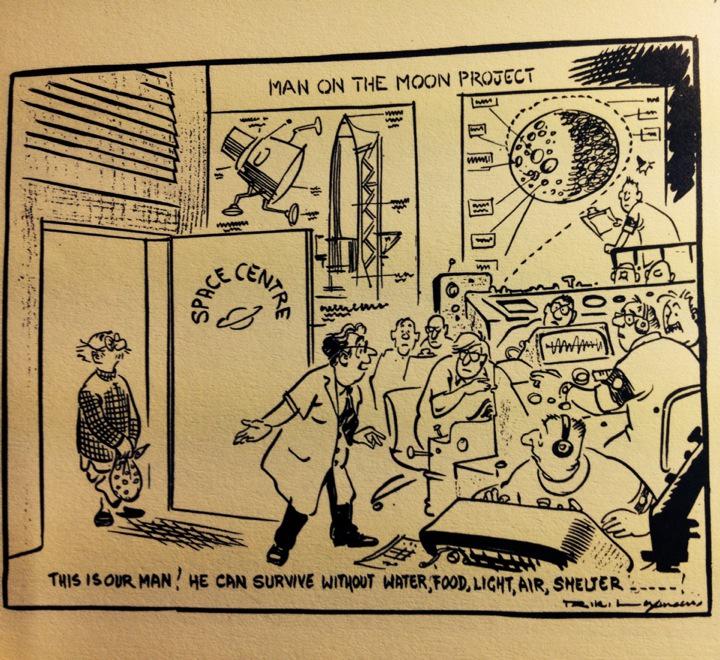Following the daily "You said it" cartoon series in Times of India was a passion for many upright, educated, urban English newspaper readers in India. Readers of Times of India would first read the cartoon strip before reading even the headlines. He was consistently dear to his readers via a perfect blend of sharp wit, stinging satire and nuanced portrayal of India's public life. It all started in 1951 and continued till he got paralyzed due to a stroke in 2003. It took "The Common Man" and his concerns to a platform where none can simply choose to ignore him.
He was born as Rasipuram Krishnaswamy Laxman on 24 October, 1921 in Mysore. The youngest of six brothers, Laxman had as his older brother, the legendary R.K. Narayan, the creator of Malgudi. He married writer Kamala and has a son, Srinivas. He was awarded Padma Bhushna in 1973 and Padma Vibushana came in 2005. The Ramon Magsaysay award was conferred on him in 1984. He passed away on the 26 January, 2015. Laxman was being treated for a urinary tract infection and kidney
failure, doctors told The Hindu newspaper, and had been put on a
ventilator. He was reported to have suffered several strokes since 2010. He wrote an autobiography titled The Tunnel of Time in 1988.
A colossal loss indeed. His Common Man was the true tale of an ordinary Indian citizen in its time. Take a look at this particular cartoon published in 1969.
He told the world in the most simple manner possible that if you wanted to find highly deprived human being, who survives on thin air, look no further than India. Most of his similar iconic cartoons from 1960s and 1970s will be relevant if reproduced today. His Common Man never spoke. Silently watching the events, the Common Man represented the silent majority of India who had no voice.
His liking for the politicians was equally deep. Take a look at this cartoon which mocked the Emergency.
Mr. Laxman said, "What politics is all about today. Blah-blah-blah. The day that stops and
the quality of our leaders improve, I will have to retire and go away.". He often said politicians appeared to be to behaving as if they were perpetually modelling for the cartoonist. He was acutely aware of the lax political accountability in the country and thoroughly enjoyed puncturing the politician’s ego, exposing double standards.
If there was ever anything that Mr. Laxman wanted to do, it was sketching. He started doing that as early as when he was 11. He was rejected by the famous J.J. School of Arts in Mumbai. The same institute felicitated him much later after he had earned a name. He took the opportunity to thank the then Dean for rejecting him so that he turned into a full-time cartoonist. His eagerness to delve into details and make his cartoons meaningful was exemplary. He never resorted to pettiness and vulgarity to achieve his goal. For instance, unlike many in his trade, he never sketched anyone as an animal. But his genius lay in the ability to find the right metaphor, the apt imagery to convey a sentiment. In 1981, when Y.B. Chavan rejoined the Indira Gandhi faction of the Congress, Laxman sketched his homecoming by showing him entering through the dog flap, instead of the main door.
The Crow was his "most intelligent bird". He used to draw several sketches of crows in his free time. Crows make an appearance in many of his cartoons. All TV illustrations for Malgudi Days were sketched by him. In many of these, the synergy between the Man and the Nature were portrayed by crows and Swami.
His last cartoon was for ISRO congratulating them for the successful Mars Mission.
People invariably connected with the Common Man, and Laxman’s work
represented the bewilderment of the poor, contrasting it with the
corruption of the ruling classes. His work will always bring a smile or
draw a laugh and make you realise the grim irony and unchanging nature
of the world we live in.



Respectful Regards.
ReplyDelete